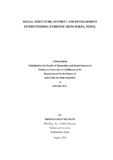Please use this identifier to cite or link to this item:
http://archive.nnl.gov.np:8080/handle/123456789/42| Title: | Social structure, poverty and development interventions: evidence from Dolpa, Nepal |
| Authors: | Neupane, Shesh Raman |
| Keywords: | Poverty -- Nepal Dolpa Development intervention -- Nepal Social structure |
| Issue Date: | 15-Dec-2017 |
| Abstract: | The main sufferers of poverty have been one fourth of Nepalese citizens who are poor. Nepal today remains one of the poorest countries in the world. At this moment of Nepal’s desperate straits, this dissertation “Social Structure, Poverty and Development Interventions : Evidence from Dolpa, Nepal” is undertaken with the hope that it would contribute towards understanding the root causes of the failures of poverty focused development interventions to empower the poor for social change. Despite of several years of development investment and experiments in the country especially in far remote area of the high hill districts, poor people’s livelihoods have not been improved sustainability. Series of policies, plans, programmes and projcets related to development were circulated in the name of improving the poor's situations but all these efforts have largely failed to improve the poverty situation on rural area. The focus on development schemes and actions fulfill their immediate needs like food but not address the problem of sustainability and local production. As indicated by the study findings, the attitudinal change and development of a true participatory culture, above everything else, seems to be very crucial for enhancing and promoting the independent development culture in Nepal. Tripurakot, study area for this study in Dolpa district of Nepal is a far remote area of the country.This study proceedes from the assumption that the effect of development intervention is always good and it helps to strengthen the living standards of the people. People experience both good and destructive effects from various forms of development Interventions . One such project sought to facilitate development using a culturally valuable agent, work for food and other poverty focused programme, with its natives’ natural lifestyle. Role of development should be as mediator between these two forces in this time of remarkable transition. Within this collaboration, we can even work to develop something sacred and bring an integral form of development to community’s full needs. Obviously, many variables would need to be weighed into a formula for why development intervention is linked to the social institutions of the government, economy, family, and culture. The answer is not short and sweet, nor all of the reasons obvious (although they may seem to be at first glance), but certainly programmes for the community also help the rich get richer, and make the poor get poorer. With the simple method being obviously ineffective, more studies need to be carried out to find the reasons why… why poverty is affected so deeply by social structure and how that cycle can be broken. Food aid (when not for emergency relief) can actually be very destructive on the economy of our country and contribute to more hunger and poverty in the long term. Free, subsidised, or cheap food, below market prices undercuts local farmers, who cannot compete and are driven out of jobs and into poverty. Many poor nations like Nepal are dependent on farming, and so such food aid amounts to food dumping. In the past few decades, more powerful nations have used this as a foreign policy tool for dominance rather than for real aid. Due to the same reason, the study area is found to have remained in massive poverty despite various development Interventions. The signification of the dissertation is both applied and theoritical. An anti-poverty development intervention is not just an academic perception or any other development approach. It needs to be linked with the entire social norms and values. At one level this study makes a contibution to the sociological aspects of poverty in general and development policies in particulars. The study argues that various development interventions have only addressed the short-term development needs of the local people. Such interventions however have dependency of the local people upon government and non-government agencies. |
| Description: | A Dissertation Submitted to the Faculty of Humanities and Social Sciences of Tribhuvan University in fullfillment of the requirements for the Degree of Doctor of Philosophy in Sociology, Tribhuvan University, Kathmandu, Nepal, 2014. |
| URI: | http://103.69.125.248:8080/xmlui/handle/123456789/42 |
| Appears in Collections: | 300 Social sciences |
Files in This Item:
| File | Description | Size | Format | |
|---|---|---|---|---|
| Dissertation_SR_Neupane_August_22_2014.pdf | 2.58 MB | Adobe PDF |  View/Open |
Items in DSpace are protected by copyright, with all rights reserved, unless otherwise indicated.